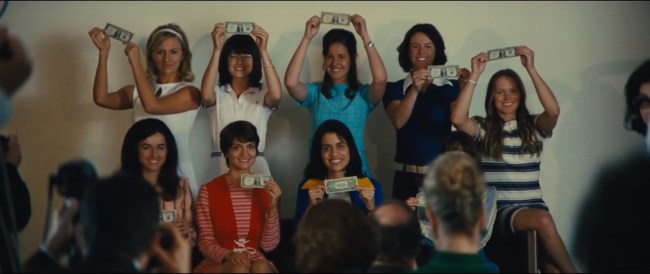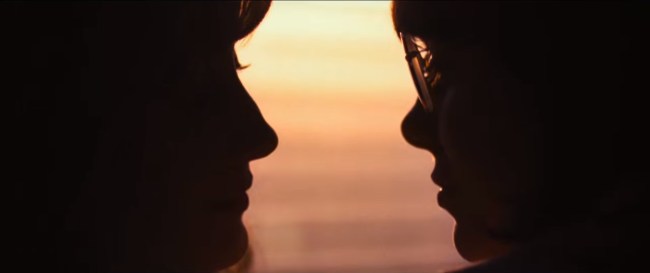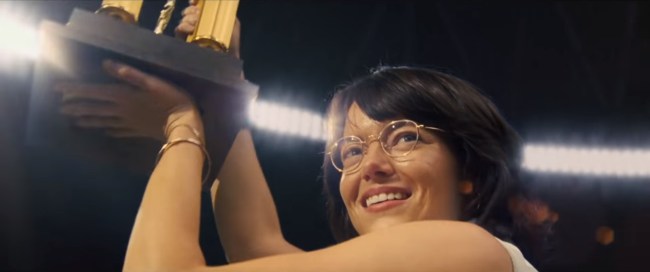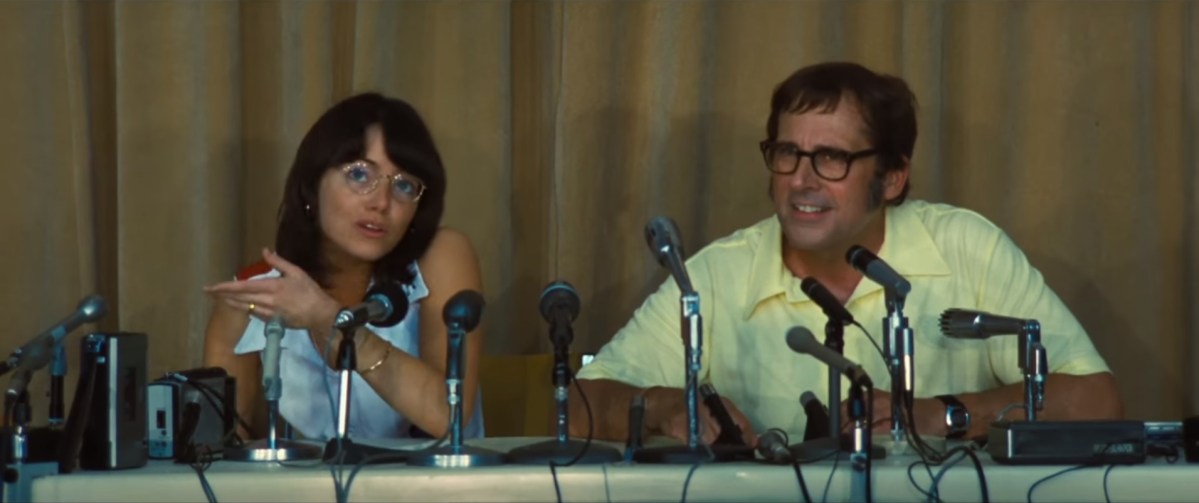You know a film based on historical events is good when you know exactly how it’s going to end, and you still find yourself on the edge of your seat hoping everything is going to turn out okay, because you’ve become so invested in the characters onscreen that you’re sucked into their story as if it’s unfolding for the first time. That is Fox Searchlight’s Battle of the Sexes.
Battle of the Sexes tells the story of the events leading up to the historic tennis exhibition match between tennis phenom Billie Jean King (Emma Stone) and former tennis champion—and self-proclaimed male chauvinist—Bobby Riggs (Steve Carell).
Right at the top, we’re introduced to the ingrained sexism of the time and of the sports world as the film begins with Billie Jean and Gladys Heldman (Sarah Silverman), founder of World Tennis Magazine and supporter of women’s tennis, meeting with Jack Kramer (Bill Pullman), former tennis champion and the biggest promoter of tennis tours about the pay gap between male and female players. The women are told that men get paid more, because 1) they have families to raise, and 2) they’re “more interesting to watch.”
Billie Jean calls this into question, citing the fact that the women’s matches had equal ticket sales. Women bring in half the money, they should receive the same pay, no? Apparently, no. After trying to reason with Jack and not making a dent, Billie Jean threatens a boycott, saying that the female players will walk and start their own tour, taking their ticket sales with them. Kramer seems unperturbed, and so Billie Jean and Gladys walk out, determined to make good on Billie Jean’s threat, despite not being entirely sure what they’re doing.
Billie Jean and eight of the other top female players in tennis left the USLTA and struck out on their own, building a new tour from scratch entirely on their own. And so, the Virginia Slims Circuit was born.

In addition to telling the story of Billie Jean’s fight for gender equality in tennis, it also tells the story of how she began discovering the fact that she was a lesbian, which was complicated by the fact that she had a loving husband in Larry King (Austin Stowell), a fellow tennis player and staunch supporter of her efforts to improve gender equality in the game.
While on tour, she meets a hairdresser named Marilyn Barnett (Andrea Riseborough) with whom she forms an immediate connection. Marilyn ends up going on tour with the players as their hairdresser, and she and Billie Jean embark on an affair. Naturally, this puts a strain on her relationship with Larry. Indeed, it puts a strain on her entire life, as Billie Jean is a notoriously private person, who was doubly private about her sexuality, so as not to threaten her sports career, which it’s argued in the film is her true love.
Just as the “Battle of the Sexes” match had two opponents, the film pays equal attention to its portrayal of Bobby Riggs, an older player who was a “tennis star” at a time when tennis wasn’t a huge deal. Now in his 50s, Riggs is doing whatever he can to bring money in to make up for what he feels was his due that he never received. Bouncing between his tennis playing on the senior circuit, hustling for sponsorship deals and fame, and his huge gambling addiction, Riggs does whatever he can to be adored and paid, all while his wife Priscilla Wheelan (Elizabeth Shue) bankrolls his life.
His call to Billie Jean to challenge her to a match is yet another one of these elaborate schemes, born of desperation and pride and pain.

Directors Valerie Faris and Jonathan Dayton, who’ve worked with Carell before on their wonderful feature film debut Little Miss Sunshine, do a beautiful job of eliciting the performances and moments that show the viewer the deep humanity of each of these characters.
When Larry puts it together that Billie Jean is cheating on him with a woman, there’s no huge explosion, and yet you feel punched in the gut by their interaction after that. When Riggs’ own marriage implodes and Priscilla asks him to leave, again, there’s no loud, explosive display even from this showman. And when Marilyn realizes that even she will never trump tennis in Billie Jean’s heart, her leaving is a restrained and quiet moment.
In all these relationships, respect is paid to all the participants, and Faris and Dayton—a married couple themselves—emphasize the fact that there is real love, care, and kindness between these people, and these directors don’t add emotional pyrotechnics to already difficult situations for the sake of visuals or “drama.” They tend toward quieter moments, making the intensely emotional scenes all the more powerful.
Their filmmaking is bolstered by a wonderful script by Simon Beaufoy (The Hunger Games: Catching Fire, Slumdog Millionaire). Something I appreciated right away is that the film didn’t waste time setting up Billie Jean’s childhood or early tennis career, which usually leads to a bloated (and boring) first act. We’re plunged right into the action when Billie Jean is at the top of her game and beginning her feminist activism, and we hit the ground running.
While the script is always on Billie Jean’s side, it spends an equal amount of time exploring Riggs’ life and motivations. Billie Jean isn’t perfect, and Riggs isn’t a monster. Even Jack, who is the worst, most shudder-inducing sexist in the whole film, has visible, human cracks that the film allows us to see. This telling of events is about as even-handed as its possible to be, which makes for a more nuanced and interesting story.

Meanwhile, cinematographer Linus Sandgren and composer Nicholas Britell each do amazing work in contributing to the period feel of the film. Battle of the Sexes doesn’t look or sound like a “period piece,” it looks and sounds like a film that was made in the 1970s, and that’s in large part due to the work of these two, as well as a top-notch production design and costuming.
What holds all of these efforts together is a cast full of brilliant performances. There isn’t a weak link in the entire cast.
I would not be surprised if Emma Stone receives another Oscar nomination for this film. Her work here is stunning, and she fully embodies Billie Jean both emotionally and physically. If you look up footage of Billie Jean King playing tennis on YouTube after seeing this film like I did, you’ll understand the full scope of Stone’s portrayal. For her first time playing a character based on a real person, she absolutely nails it.
Carell is surprisingly heartbreaking as Riggs. I say “surprisingly,” because I came into the film expecting to hate this guy. However, through Carell’s nuanced portrayal we understand that Riggs was a man who was so desperate to be liked that he would spout anything to get attention. As Billie Jean wins their historic match, there’s a moment where you truly feel sorry for this guy and the devastation he feels, not only over the match, but over his whole messy life.
Two other stand-outs were Jessica McNamee as Margaret Court, the first woman Riggs got to play him and beat, and Austin Stowell as Larry. Margaret is a devout Catholic, and staunchly anti-LGBTQIA. In lesser hands, she could’ve come off like a cartoon villain. Instead, McNamee plays her with a restrained grace that allows us to feel the humiliation of her loss to Riggs, and subsequent pride in Billie Jean’s win, because we never stop being in touch with her humanity.
And Stowell basically gives us the most Perfect Husband Ever in his portrayal. Not in a saccharine way, but he gives us a very believable and lived-in performance of an Upstanding, Good Dude. Complicated and nuanced doesn’t have to be “anti-hero.” Kind, loving people can be nuanced and complicated, too.
Battle of the Sexes is an inspirational film. Again, not in a saccharine or cheesy way, but in a real way that will resonate with you and remind you that not only is there still work to be done in the cause of equality, but that you are capable of doing it. This film feels like a balm in today’s hostile political climate, and I would highly recommend it if your social justice batteries need recharging.
Battle of the Sexes opens today.
(image: screencap/Fox Searchlight)
Want more stories like this? Become a subscriber and support the site!
—The Mary Sue has a strict comment policy that forbids, but is not limited to, personal insults toward anyone, hate speech, and trolling.—









Published: Sep 22, 2017 10:16 am